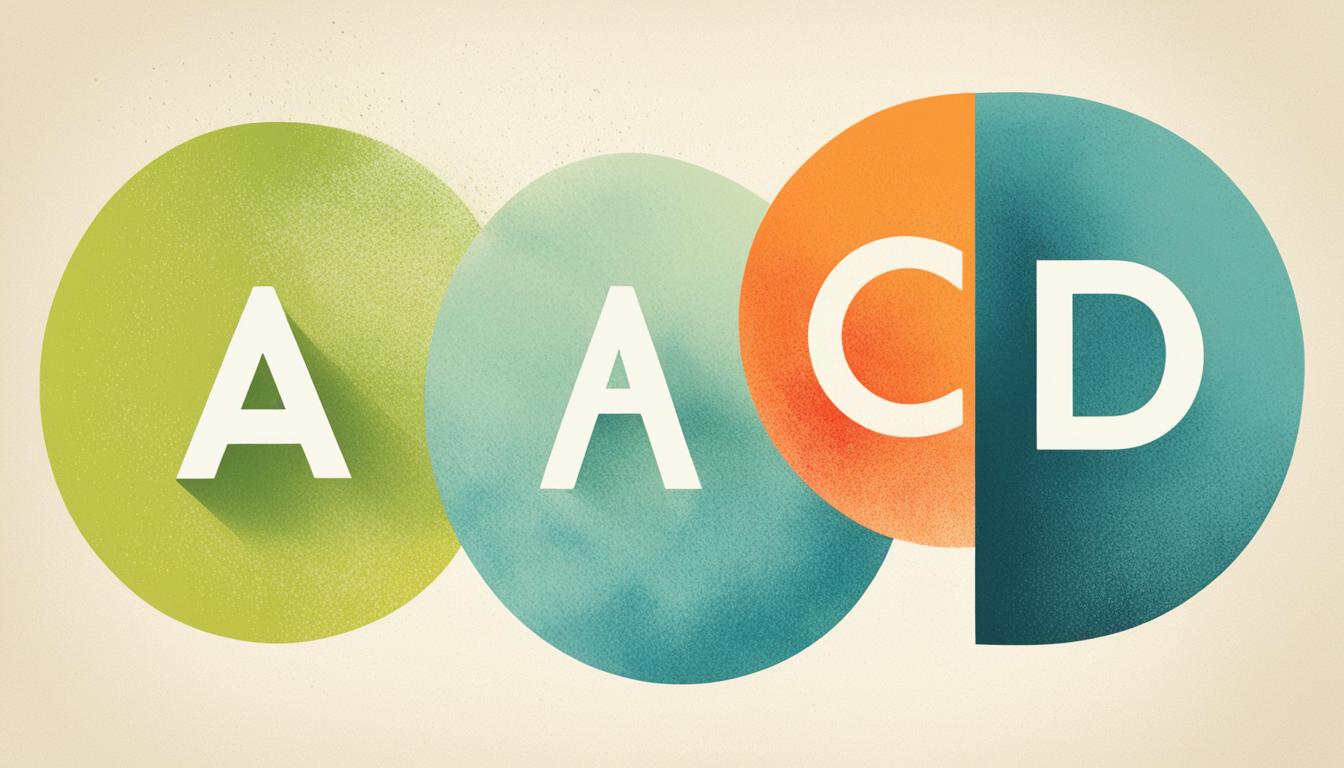Were you aware that around 9.1% of the US population has received a diagnosis of a personality disorder?
The Cluster B Personality Disorders Test is a powerful online tool designed to help individuals understand their interpersonal and emotional traits. Whether you’re curious about your own personality or seeking personal growth and improved relationships, this test can provide valuable insights without judgment or diagnosis.
Key Takeaways:
- Take the Cluster B Personality Disorder Test for self-discovery and personal growth.
- The test helps identify interpersonal and emotional traits associated with Cluster B disorders.
- Understanding personality disorders can lead to professional guidance and improved relationships.
- Seeking therapy, such as Dialectical Behavior Therapy (DBT), can be crucial in managing Cluster B traits.
- The Cluster B Personality Disorder Test provides recommendations for improvement and self-help strategies.
Why Take the Cluster B Personality Disorder Test?
Taking the Cluster B Personality Disorder Test is a crucial step towards personal growth and self-discovery. By delving into our motivations and emotions, we can gain valuable insights and develop a deeper understanding of ourselves. This test enables us to uncover potential traits associated with Borderline or Narcissistic Personality Disorder and provides a foundation for personal development.
Insight into our personality is the gateway to emotional clarity and improved relationships. By understanding our own behaviors and triggers, we can take proactive steps towards growth and positive change. The Cluster B Personality Disorder Test empowers us with the knowledge needed to make informed decisions and seek professional guidance if necessary.
“The greatest journey involves understanding ourselves.”
Through this test, we gain the opportunity to explore our thoughts, emotions, and patterns of behavior. By recognizing the contributing factors to our personality traits, we can navigate personal challenges more effectively. This journey of self-discovery allows us to unlock our potential and embrace personal growth.
Embarking on the Cluster B Personality Disorder Test is a significant stride towards emotional clarity. It offers us the chance to uncover hidden aspects of ourselves that may have previously gone unnoticed. With this newfound insight, we can make intentional choices and develop healthier coping strategies.
Discover the Benefits of Taking the Cluster B Personality Disorder Test:
- Uncover potential traits associated with Borderline or Narcissistic Personality Disorder
- Gain valuable insights and a deeper understanding of ourselves
- Develop self-awareness and identify personal growth opportunities
- Enhance emotional clarity and improve decision-making
- Strengthen relationships through improved communication and understanding
By embracing the journey of self-discovery and taking the Cluster B Personality Disorder Test, we set ourselves on the path to personal growth, emotional clarity, and improved relationships. Let us embark on this transformative exploration, gaining insights that will shape the future of our well-being.
Understanding Cluster B Personality Disorders
Cluster B personality disorders are characterized by dramatic, overly emotional, or unpredictable thinking and behavior. These disorders include Borderline Personality Disorder, Narcissistic Personality Disorder, Histrionic Personality Disorder, and Antisocial Personality Disorder. Each disorder presents its unique set of symptoms and challenges, but all involve difficulties in regulating emotions and maintaining stable relationships.
Comparison of Cluster B Personality Disorders
| Disorder | Symptoms | Challenges |
|---|---|---|
| Borderline Personality Disorder | Intense fear of abandonment, unstable relationships, impulsive behavior, self-harm, mood swings | Emotional instability, identity disturbances, chronic feelings of emptiness |
| Narcissistic Personality Disorder | Grandiosity, excessive need for admiration, lack of empathy, sense of entitlement | Difficulty maintaining meaningful relationships, hypersensitivity to criticism |
| Histrionic Personality Disorder | Attention-seeking behavior, excessive emotionality, superficial relationships | Difficulty coping with distress, reliance on others for self-esteem |
| Antisocial Personality Disorder | Lack of remorse, disregard for others’ rights, deceitfulness, impulsivity | Repeated legal problems, difficulty maintaining employment and relationships |
The comparison table highlights key differences and commonalities among Borderline Personality Disorder, Narcissistic Personality Disorder, Histrionic Personality Disorder, and Antisocial Personality Disorder. Understanding these disorders can shed light on the challenges individuals face and the importance of seeking appropriate support and treatment.
Expert Perspective on Cluster B Personality Disorders
When it comes to managing Cluster B personality traits, one expert reference stands out: Dr. Marsha Linehan, a renowned figure in psychology. Drawing from years of research and practice, Dr. Linehan emphasizes the importance of therapy, particularly Dialectical Behavior Therapy (DBT), in effectively addressing Cluster B personality disorders.
DBT is a comprehensive therapy approach that focuses on building skills in mindfulness, emotional regulation, distress tolerance, and interpersonal effectiveness. Its evidence-based techniques have shown significant improvements in patients with Cluster B personality disorders, providing them with tools to navigate the challenges they face.

“DBT equips individuals with the necessary skills to manage their emotions, improve their relationships, and ultimately lead more fulfilling lives,” emphasizes Dr. Linehan.
The Power of Dialectical Behavior Therapy (DBT)
DBT has become a widely recognized and effective therapy for managing Cluster B personality disorders. Its core principles focus on finding a balance between accepting oneself as they are while also striving for change within a supportive therapeutic environment.
By learning mindfulness techniques, individuals can increase their awareness of emotions and thoughts, allowing them to better regulate their responses and reduce impulsive behavior. The emphasis on distress tolerance equips individuals with coping skills to navigate difficult situations and contain intense emotions effectively.
Furthermore, DBT emphasizes the development of interpersonal effectiveness skills, empowering individuals to establish and maintain healthier relationships by improving communication and problem-solving abilities.
Collaborative Treatment Journey
Understanding that no two individuals are the same, DBT takes a collaborative approach, involving both the therapist and the individual in the treatment process. In this supportive and empowering therapeutic relationship, individuals have the opportunity to explore and address their unique challenges and work towards desired changes.
Through a combination of individual therapy, group therapy, skill-building exercises, and phone coaching, individuals can gain practical tools to manage their symptoms, increase emotional stability, and develop a stronger sense of self. DBT provides a comprehensive framework for building a more fulfilling life, even in the face of complex personality disorders.
Expert Recommendation: Seeking Professional Help
While it’s valuable to educate oneself on Cluster B personality disorders and DBT, seeking professional help is essential for a comprehensive and accurate diagnosis, as well as tailored treatment plans.
If you suspect that you or a loved one may be experiencing Cluster B personality traits, we strongly recommend reaching out to a licensed mental health professional who specializes in personality disorders and DBT. They can provide expert guidance, support, and personalized treatment that aligns with your specific needs.
How the Cluster B Personality Disorder Test Works
The Cluster B Personality Disorder Test is designed to provide individuals with valuable insights into their personality traits related to Cluster B disorders. By answering a series of questions, individuals can gain a better understanding of which traits are most prominent in their lives. While the test does not provide a diagnostic tool, it can serve as an indicator for further evaluation by a professional.
The test consists of carefully crafted questions that assess different aspects of one’s behavior, emotions, and interpersonal relationships. These questions are designed to capture the typical characteristics associated with Cluster B personality disorders, such as Borderline Personality Disorder, Narcissistic Personality Disorder, Histrionic Personality Disorder, and Antisocial Personality Disorder.

After answering the test questions, individuals receive a scoring based on their responses. The scoring helps identify the most evident traits in their personality, providing valuable insights for self-reflection and self-awareness. It is important to note that the test results are not a substitute for professional evaluation or diagnosis.
Interpreting the test results involves reflecting on the traits that scored the highest. Individuals can gain valuable insights into their patterns of thinking, emotional regulation, and interpersonal behavior. These insights can serve as a starting point for personal growth, improving relationships, and seeking further professional guidance, if needed.
Interpreting and Acting on Test Results
Once you have completed the Cluster B Personality Disorder Test, you will receive a range of scores corresponding to the four Cluster B personality disorder types. These scores provide valuable insights into the most evident traits in your life, helping you gain a deeper understanding of yourself.
Interpreting your test results is an essential step in personal growth and improving your relationships. By reflecting on your scores, you can identify areas where you may exhibit borderline, narcissistic, histrionic, or antisocial traits. This self-awareness allows you to take proactive steps towards self-improvement and emotional clarity.

“Knowing yourself is the beginning of all wisdom.” – Aristotle
Recommendations for Improvement
Along with test results, the Cluster B Personality Disorder Test provides specific recommendations for improvement. These recommendations are tailored to help you address any problematic traits and cultivate personal growth. Here are a few suggestions:
- Seek professional help: Consider consulting a licensed psychologist or psychiatrist who can provide guidance and develop a personalized treatment plan.
- Practice mindfulness: Engage in mindfulness exercises to develop a greater sense of self-awareness and emotional regulation.
- Emotional regulation exercises: Learn techniques to manage your emotions effectively, such as deep breathing, journaling, or seeking support from loved ones.
- Consider therapy options: Investigate therapy options like Dialectical Behavior Therapy (DBT), which focuses on enhancing emotional regulation and interpersonal skills.
Remember, understanding your test results is just the first step. It is crucial to take action and implement positive changes in your life to promote personal growth and well-being.
Understanding Personality Disorders and Their Impact
Personality disorders can have a significant impact on interpersonal interactions and mental health. These disorders are characterized by persistent disruptive thought patterns, behaviors, and moods that can affect the way individuals interact with others. People with personality disorders often face challenges in their relationships and may experience distress in their daily lives.
Interacting with someone who has a personality disorder can be challenging, as their behaviors and emotions may be unpredictable. It can be difficult to understand their motivations and reactions, leading to misunderstandings and conflicts. This can strain relationships with family, friends, and even healthcare professionals.
It’s important to recognize that personality disorders not only affect the individuals themselves but also those around them. Family members and friends may struggle to understand and cope with their loved one’s behavior, leading to frustration and emotional exhaustion.
Understanding the signs and causes of personality disorders is crucial for finding appropriate support and treatment. By recognizing the symptoms, individuals and their loved ones can gain empathy and insight into the challenges they face. It also opens up opportunities for seeking professional help and developing strategies to manage the impact of the disorder.
Personality disorders can disrupt lives and strain relationships. It is essential to approach individuals with empathy, understanding, and a commitment to support their well-being.
Impact on Interpersonal Interactions
The nature of personality disorders can significantly impact how individuals interact with others. Some common challenges include:
- Difficulties forming and maintaining stable relationships
- Intense and unstable emotions that can lead to conflicts
- Impulsivity and impulsive behaviors that can strain relationships
- Feelings of emptiness and fear of abandonment that affect trust
- Difficulty regulating emotions, leading to unpredictable reactions
These challenges can make it hard for individuals with personality disorders to establish meaningful connections and build healthy relationships. Social support and understanding from loved ones become crucial in helping them navigate these difficulties.
Mental Health Disorders
Personality disorders are classified as mental health disorders, as they involve persistent patterns of thoughts, feelings, and behaviors that significantly deviate from societal norms. The impact of these disorders extends beyond interpersonal interactions, affecting an individual’s overall mental well-being.
People with personality disorders may experience other mental health challenges such as anxiety, depression, or substance abuse. These comorbid conditions further complicate their ability to function and find stability in life.

| Personality Disorder | Main Symptoms |
|---|---|
| Borderline Personality Disorder (BPD) | Instability in relationships and emotions, impulsivity, identity disturbance |
| Narcissistic Personality Disorder (NPD) | Grandiosity, need for admiration, lack of empathy |
| Histrionic Personality Disorder (HPD) | Excessive attention-seeking, exaggerated emotions, strong need for approval |
| Antisocial Personality Disorder (APD) | Disregard for others’ rights, lack of remorse, manipulative behavior |
Signs and Causes of Cluster B Personality Disorders
Cluster B personality disorders, including Borderline Personality Disorder, Narcissistic Personality Disorder, Histrionic Personality Disorder, and Antisocial Personality Disorder, are characterized by dramatic and unpredictable thinking and behavior.
Signs of Cluster B personality disorders can vary depending on the specific disorder, but common manifestations include:
- Intense fear of abandonment
- Impulsive and risky behavior
- Chronic feelings of emptiness
- Extreme mood swings
- Difficulty in maintaining stable relationships
- Self-centeredness and lack of empathy
- Attention-seeking and dramatic behavior
- Aggression and disregard for the rights of others
| Personality Disorder | Signs and Symptoms |
|---|---|
| Borderline Personality Disorder | Intense fear of abandonment, unstable relationships, emotional instability, self-harming behavior |
| Narcissistic Personality Disorder | Exaggerated sense of self-importance, need for admiration, lack of empathy, arrogant behavior |
| Histrionic Personality Disorder | Constant need for attention, dramatic and attention-seeking behavior, shallow emotions |
| Antisocial Personality Disorder | Disregard for others’ rights, impulsivity, lack of remorse, manipulative behavior |
The causes of Cluster B personality disorders are complex and can include a combination of factors:
- Genetic traits: Some individuals may have a genetic predisposition to developing these disorders.
- Brain changes: Structural and functional abnormalities in the brain can contribute to the development of these disorders.
- Childhood trauma: Experiences such as abuse, neglect, or unstable family environments can increase the risk of developing a Cluster B personality disorder.
- Cultural considerations: Sociocultural factors, including societal norms and expectations, can influence the expression of these disorders.
Understanding the signs and causes of Cluster B personality disorders is crucial for individuals to seek appropriate help and support. By recognizing these disorders and their underlying factors, individuals can take steps towards managing their symptoms and improving their overall well-being.

Taking a Personality Disorder Test for Self-Knowledge
Are you experiencing symptoms that are causing concern about your mental health? Taking a personality disorder test can provide valuable insights and help you better understand your symptoms and potential mental health condition.
These tests serve as a starting point for self-knowledge, enabling you to identify if your symptoms align with a personality disorder. They can provide clarity and assist you in gaining a better understanding of your mental health.
By taking the test, reflecting on the results, and considering the symptoms that resonate with you, you can begin to develop a clearer picture of your mental well-being and determine if seeking professional help is necessary.
“Taking a personality disorder test can be the first step in gaining insights into one’s traits and seeking appropriate support and treatment.”
Remember, these tests are not a substitute for a professional diagnosis but can be a useful tool in initiating self-reflection and prompting further exploration of your mental health concerns.
If you find that your symptoms align with a personality disorder, it’s essential to reach out to a licensed psychologist or psychiatrist for an accurate diagnosis and appropriate treatment plan. They can provide the support and guidance necessary to help you manage your symptoms effectively.

Remember, seeking help is a sign of strength, and your mental well-being deserves attention and care. By taking the first step towards self-knowledge through a personality disorder test, you are prioritizing your mental health and setting yourself on a path of understanding and personal growth.
Coping with Personality Disorders
Coping with personality disorders is a challenging but necessary journey towards personal growth and improved self-knowledge. It requires self-awareness, a willingness to seek help, and the courage to trust others. Understanding that personality disorders can cause pain to both oneself and others is essential in the quest for growth and well-being. Recognizing the need for assistance is the first step towards seeking the necessary support.
One effective way to cope with personality disorders is through therapy and professional guidance. Therapists specializing in personality disorders can provide invaluable insights and strategies for understanding and managing your unique traits. They can help you navigate the complexities of your condition and guide you towards a better understanding of yourself. Through therapy, you can develop coping mechanisms, improve emotional regulation, and enhance your interpersonal skills.
Additionally, engaging in support groups or finding a community of individuals with similar experiences can offer a sense of belonging and understanding. Sharing your challenges, triumphs, and insights with others who can relate provides a supportive environment for growth and healing.
Remember, seeking help is not a sign of weakness, but an act of strength. It takes courage to acknowledge the need for support and to take the necessary steps towards self-improvement. By embracing professional help and engaging in therapeutic approaches, you can gain the tools and knowledge necessary to cope with the challenges that personality disorders may present.
“The journey towards self-improvement and managing personality disorders may have obstacles, but with the right support and guidance, it is possible to thrive and find inner peace.” – Dr. Catherine Roberts, Clinical Psychologist
Strategies for Coping with Personality Disorders
When coping with a personality disorder, it can be beneficial to implement various strategies that promote self-care and emotional well-being. Here are some approaches that can help:
- Develop a consistent self-care routine: Practicing self-care activities, such as exercise, meditation, and journaling, can help reduce stress and improve overall mental well-being.
- Seek support from loved ones: Share your journey with trusted friends and family members who can provide emotional support and understanding.
- Build healthy relationships: Surround yourself with positive influences and cultivate relationships that nurture your well-being.
- Practice mindfulness: Engage in activities that promote being present in the moment, such as yoga or deep breathing exercises.
- Set boundaries: Establish clear boundaries in your relationships to protect your emotional well-being and prevent unhealthy interactions.
Professional Support Options for Coping with Personality Disorders
| Therapeutic Approaches | Description |
|---|---|
| Dialectical Behavior Therapy (DBT) | A therapy approach specifically designed to help individuals with personality disorders regulate emotions, improve interpersonal skills, and develop coping mechanisms. |
| Cognitive-Behavioral Therapy (CBT) | A widely used therapeutic approach that focuses on identifying and changing negative thought patterns and behaviors. |
| Group Therapy | A form of therapy where individuals with personality disorders come together to discuss their experiences, challenges, and strategies in a supportive environment. |

Treatment Options for Personality Disorders
Personality disorders are recognized as mental illnesses that typically require a combination of treatments to address their complex nature. In order to provide effective care and support, a comprehensive approach involving psychotherapy, medications, and collaboration with mental health specialists is often recommended.
The Role of Psychotherapy
Psychotherapy plays a vital role in treating personality disorders by helping individuals gain insight into their thoughts, behaviors, and emotions. One commonly used approach is cognitive-behavioral therapy (CBT), which focuses on identifying and changing negative thought patterns and behaviors. Through regular therapy sessions, individuals can develop coping mechanisms, improve their emotional regulation, and enhance their overall well-being.
By working closely with a trained mental health professional, individuals with personality disorders can gain a better understanding of their condition and learn healthier ways to navigate life’s challenges. The guidance and support provided by psychotherapy can empower individuals to make positive changes and improve their quality of life.
Medications in Managing Symptoms
While there are no specific medications approved for treating personality disorders, medications may be prescribed to manage accompanying symptoms such as anxiety, depression, or mood instability. These medications can help individuals stabilize their emotions, minimize symptoms, and enhance their ability to engage in therapy effectively.
Collaboration with Mental Health Specialists
Collaborating with mental health specialists, such as psychologists or psychiatrists, is crucial in addressing the unique challenges posed by personality disorders. These professionals have specialized knowledge and expertise in diagnosing and treating mental health conditions and can guide individuals towards the most suitable treatment options.
Remember, seeking professional help is essential for effective treatment. Consultation with a mental health specialist can provide individualized care, tailored treatment plans, and ongoing support throughout the recovery process.

| Treatment Options for Personality Disorders | Benefits |
|---|---|
| Psychotherapy (e.g., cognitive-behavioral therapy) |
|
| Medications (e.g., for anxiety or depression) |
|
| Collaboration with mental health specialists |
|
Individuals with personality disorders can find hope and support through various treatment options. A comprehensive approach, including psychotherapy, medications, and collaboration with mental health specialists, can significantly improve their well-being and help them lead fulfilling lives.
The Role of Psychotherapy in Treating Personality Disorders
When it comes to treating personality disorders, psychotherapy plays a crucial role in helping individuals overcome their challenges and improve their overall well-being. Through therapy, individuals can gain a deeper understanding of the underlying causes of their disorders and develop effective strategies to cope with symptoms and enhance their daily functioning.
One commonly used approach in treating personality disorders is cognitive-behavioral therapy (CBT). This therapeutic technique focuses on identifying and modifying negative thought patterns and behaviors that contribute to the disorder. By addressing these maladaptive patterns, individuals can learn new ways of thinking and behaving, leading to positive changes in their lives.
Regular therapy sessions provide individuals with a safe and supportive space to explore their emotions, work through past traumas, and develop practical skills to manage their symptoms. Alongside the guidance of a trained therapist, individuals can learn techniques to regulate their emotions, improve their interpersonal relationships, and cultivate a more positive self-image.
The Benefits of Cognitive-Behavioral Therapy in Personality Disorder Treatment
Cognitive-behavioral therapy offers several key benefits in the treatment of personality disorders:
- Identifying and challenging negative thought patterns: CBT helps individuals recognize and challenge unhealthy thinking patterns that contribute to their disorder. By reframing negative thoughts, individuals can develop a more balanced and realistic perspective.
- Developing coping mechanisms: Through therapy, individuals learn effective coping mechanisms to manage distressing emotions and behaviors. These techniques empower individuals to handle challenging situations with greater resilience and self-control.
- Improving interpersonal skills: CBT focuses on enhancing interpersonal effectiveness, helping individuals develop healthier ways of relating to others. By improving communication and problem-solving skills, individuals can build and maintain more fulfilling relationships.
- Enhancing self-awareness: Therapy provides individuals with the opportunity to gain a deeper understanding of themselves, their emotions, and their triggers. This increased self-awareness allows individuals to make more informed choices and cultivate a greater sense of self-control.
Supporting Data on the Effectiveness of Psychotherapy in Personality Disorder Treatment
Research and clinical studies have consistently demonstrated the effectiveness of psychotherapy, particularly cognitive-behavioral therapy, in treating personality disorders. Numerous studies have shown significant improvements in symptoms, functioning, and overall quality of life for individuals who engage in psychotherapy for personality disorders.
For example, a study published in the Journal of Personality Disorders found that individuals with Borderline Personality Disorder who received dialectical behavior therapy, a type of cognitive-behavioral therapy, experienced significant reductions in self-harm behaviors and suicidality, as well as improvements in emotional regulation and interpersonal relationships.
Another study published in the Journal of Consulting and Clinical Psychology showed that individuals with Narcissistic Personality Disorder who engaged in cognitive therapy experienced a reduction in grandiose self-perceptions and improved relationships with others.
These findings highlight the potential for psychotherapy, including cognitive-behavioral therapy, to make a positive difference in the lives of individuals with personality disorders.
| Treatment Approach | Benefits |
|---|---|
| Cognitive-Behavioral Therapy (CBT) |
|
By utilizing the benefits of psychotherapy, individuals with personality disorders can make significant progress towards managing their symptoms, improving their quality of life, and fostering healthier relationships.

The Importance of Early Intervention for Personality Disorders
Early intervention is crucial in managing personality disorders. By recognizing the signs and seeking help as early as possible, individuals can significantly improve their outcomes and quality of life. Personality disorders often emerge in late adolescence or early adulthood, and addressing them promptly can prevent the development of more severe symptoms and mitigate the impact on daily functioning.
Early intervention typically involves a combination of therapy, support, and education to help individuals understand and manage their disorders effectively. By intervening early, individuals have a greater opportunity for personal growth and the development of healthy coping mechanisms. It also provides an opportunity to prevent the disorder from escalating and negatively affecting relationships, work, and overall well-being.
Research has shown that early intervention can lead to better long-term outcomes for individuals with personality disorders. With timely treatment and support, individuals can learn skills to regulate their emotions, improve their interpersonal relationships, and enhance their overall quality of life. Educating individuals and their support networks about the disorder can foster understanding and empathy, creating a supportive environment that further aids in the management and recovery process.
The Benefits of Early Intervention:
- Minimizes the impact of symptoms on daily functioning
- Improves the effectiveness of therapeutic interventions
- Reduces the risk of developing comorbid mental health conditions
- Enhances the individual’s ability to manage their emotions and behaviors
- Promotes healthier relationships and improves social interactions
By recognizing the importance of early intervention and seeking help promptly, individuals with personality disorders can take control of their lives and work towards a brighter future. With the right support, treatment, and commitment to personal growth, it is possible to manage the challenges associated with personality disorders and lead a fulfilling life.

The Role of Supportive Environments in Managing Personality Disorders
Creating a supportive environment is essential in effectively managing personality disorders. When it comes to supporting individuals with these disorders, the involvement of family, friends, and the community can make a significant difference. By providing consistent signals of acceptance and understanding, educating ourselves about these disorders, and fostering an environment that encourages growth and positive communication, we can greatly contribute to the well-being of those affected.
Understanding and empathy from those around us are vital. Individuals with personality disorders often face unique challenges in their daily lives, including difficulties in regulating emotions and maintaining stable relationships. By offering support, acceptance, and a compassionate attitude, we can help create a safe space where they can explore their feelings, thoughts, and experiences without fear of judgment.
“Creating a supportive environment is not only about helping individuals manage their symptoms; it’s about treating them with respect and dignity. Our understanding and support can have a profound impact on their overall well-being.”
— Dr. Jane Miller, Psychologist
Educating ourselves about personality disorders is also crucial. By learning about the various types of disorders, their symptoms, and their impact on individuals’ lives, we can gain a better understanding of what they are going through. This knowledge can help us respond to their needs effectively, offer appropriate guidance, and navigate potential challenges more empathetically.
In a supportive environment, open and honest communication is key. Encouraging individuals to express their thoughts and emotions without fear of judgment can foster trust and emotional growth. Active listening, providing validation, and offering practical support when needed can help individuals feel understood and accepted.
Creating a supportive environment is a continuous effort that requires patience, compassion, and a commitment to personal growth for both the individuals with personality disorders and those around them. Through our collective understanding and empathy, we can make a significant difference in their journey of managing their personality disorder.
| Benefits of a Supportive Environment in Managing Personality Disorders | |
|---|---|
| Enhanced Emotional Well-being: A supportive environment helps individuals with personality disorders feel validated, understood, and emotionally secure, leading to improved overall mental health. | Improved Relationships: By offering support and acceptance, we foster healthier interpersonal connections and create a sense of safety and trust in relationships. |
| Reduced Stigma: A supportive environment helps break down stigmas associated with personality disorders, promoting a culture of acceptance and understanding. | Promotes Personal Growth: By providing encouragement and opportunities for growth, supportive environments empower individuals to develop coping mechanisms and improve their well-being. |
| Increased Treatment Engagement: Supportive environments can motivate individuals to seek professional help, adhere to treatment plans, and actively participate in therapy, leading to better outcomes. | Positive Impact on the Community: By promoting understanding and empathy, we contribute to a more inclusive and compassionate society that supports individuals with personality disorders. |
No one should face the challenges of managing a personality disorder alone. Together, we can create supportive environments that nurture growth, understanding, and well-being, helping individuals with personality disorders lead fulfilling lives.

Conclusion: Seeking Understanding and Growth
Seeking understanding, self-knowledge, and growth is vital for individuals with personality disorders. It is the first step towards gaining insights into our traits and seeking the appropriate support and treatment. By understanding the signs, causes, and treatment options for personality disorders, we can take proactive steps towards managing our symptoms, improving our relationships, and enhancing our overall well-being.
Personal growth is a transformative journey that requires self-reflection and a commitment to bettering ourselves. Through self-awareness, we can identify our strengths and areas for improvement, and seek the necessary help and resources to foster personal growth.
When it comes to personality disorders, seeking help and support is crucial. It is essential to reach out to licensed professionals who can provide guidance and develop personalized treatment plans. Therapy, such as cognitive-behavioral therapy (CBT) or dialectical behavior therapy (DBT), can be particularly beneficial in managing personality disorders and fostering personal growth.
Remember, living with a personality disorder can be challenging, but it is not something we have to face alone. Together, we can navigate this journey towards understanding, growth, and a fulfilling life.
Conclusion
The Cluster B Personality Disorders Test is an invaluable tool for self-discovery and personal growth. By taking this online test and carefully interpreting the results, individuals can gain deep insights into their interpersonal and emotional traits. Understanding the signs, causes, and treatment options for Cluster B personality disorders empowers individuals to seek appropriate help and support for their journey towards well-being.
However, it’s crucial to remember that the Cluster B Personality Disorders Test is not a substitute for professional diagnosis. To receive an accurate diagnosis and personalized treatment plan, it is essential to consult a licensed psychologist or psychiatrist. They have the expertise to provide comprehensive evaluations and guide individuals towards the most effective therapies and interventions.
Embarking on this self-discovery journey is a significant step towards personal growth and improved relationships. By gaining a deeper understanding of oneself and seeking appropriate support, individuals can navigate their lives with greater emotional clarity and resilience. The Cluster B Personality Disorders Test offers an accessible and insightful path to self-discovery, encouraging individuals to embrace their personal growth and well-being.
FAQ
What is the Cluster B Personality Disorders Test?
The Cluster B Personality Disorders Test is an online test designed to help individuals understand their interpersonal and emotional traits. It provides valuable insights into their personality, without judgment or diagnosis.
Why should I take the Cluster B Personality Disorder Test?
Taking the Cluster B Personality Disorder Test can lead to personal growth, improved relationships, and emotional clarity. It allows individuals to uncover parts of their personality that may lean towards Borderline or Narcissistic Personality Disorder, and gain a deeper understanding of themselves.
What are Cluster B personality disorders?
Cluster B personality disorders include Borderline Personality Disorder, Narcissistic Personality Disorder, Histrionic Personality Disorder, and Antisocial Personality Disorder. They are characterized by dramatic, overly emotional, or unpredictable thinking and behavior, making it difficult to regulate emotions and maintain stable relationships.
What is the expert perspective on Cluster B personality disorders?
Dr. Marsha Linehan, a renowned figure in psychology, emphasizes the importance of therapy, particularly Dialectical Behavior Therapy (DBT), in managing Cluster B personality traits. Research and practice have shown significant improvements in patients who engage in DBT, which focuses on skills like mindfulness, emotional regulation, distress tolerance, and interpersonal effectiveness.
How does the Cluster B Personality Disorder Test work?
The Cluster B Personality Disorder Test presents a series of questions related to the typical characteristics of Cluster B disorders. Individuals answer the questions, and their responses help indicate which traits are most prominent in their personality. The test is not a diagnostic tool, but it can signal if further evaluation from a professional might be beneficial. Scoring is assigned based on the responses, and individuals can interpret their test results to gain insights into the most evident traits in their life.
How do I interpret and act on the test results?
Once individuals complete the Cluster B Personality Disorder Test, they receive a range of scores corresponding to the four Cluster B personality disorder types. Depending on where their scores fall, they can gain insights into the most evident traits in their life. The test also provides specific recommendations for improvement, which may include seeking professional help, engaging in self-help strategies like mindfulness and emotional regulation exercises, and considering therapy options like DBT.
What is the impact of personality disorders on individuals and their relationships?
Personality disorders can make navigating interpersonal interactions challenging, as they involve persistent disruptive thought patterns, behaviors, moods, and interpersonal interaction. These disorders can cause difficulties in relationships and distress in daily life, affecting not only individuals but also those around them, including family, friends, and healthcare professionals.
What are the signs and causes of Cluster B personality disorders?
Cluster B personality disorders, including Borderline Personality Disorder, Narcissistic Personality Disorder, Histrionic Personality Disorder, and Antisocial Personality Disorder, are characterized by dramatic and unpredictable thinking and behavior. The causes can include a combination of factors such as brain changes, childhood trauma, genetic traits, and cultural considerations.
Why should I take a personality disorder test?
Taking a personality disorder test can be helpful for individuals who want to understand their symptoms and potential mental health conditions. These tests provide a starting point for self-knowledge and can help individuals identify if their symptoms align with a personality disorder. By taking the test and reflecting on the results, individuals can gain a better understanding of their mental health and seek appropriate professional help if needed.
How can I cope with personality disorders?
Coping with personality disorders requires self-awareness and seeking help from professionals. Recognizing the need for assistance and trusting others can lead to personal growth and improved self-knowledge. Individuals with personality disorders can work towards understanding and managing their traits through therapy and support. It’s essential to remember that seeking help and support is crucial for growth and well-being.
What are the treatment options for personality disorders?
Personality disorders are considered mental illnesses and usually require a combination of treatments. Psychotherapy, such as cognitive-behavioral therapy, can help individuals understand and manage their thoughts, behaviors, and emotions. While no medications are specifically approved for treating personality disorders, medications may be prescribed to manage symptoms like anxiety and depression. Working with a mental health specialist, such as a psychologist or psychiatrist, can provide support, guidance, and appropriate treatment options.
What is the role of psychotherapy in treating personality disorders?
Psychotherapy plays a crucial role in treating personality disorders. It aims to help individuals understand the underlying causes of their disorders and develop strategies to cope with symptoms and improve functioning. Cognitive-behavioral therapy (CBT) is a commonly used approach in treating personality disorders, as it focuses on identifying and changing negative thought patterns and behaviors. Through regular therapy sessions, individuals can gain tools and skills to manage their symptoms and improve their overall well-being.
Why is early intervention important for personality disorders?
Early intervention is crucial in managing personality disorders. Recognizing the signs and seeking help as early as possible can lead to better outcomes and improved quality of life. Personality disorders typically emerge in late adolescence or early adulthood, and addressing them promptly can prevent the development of more severe symptoms and the impact on daily functioning. Early intervention often involves a combination of therapy, support, and education to help individuals understand and manage their disorders.
How can supportive environments help in managing personality disorders?
Creating a supportive environment is essential in managing personality disorders. Family, friends, and the community can play a vital role in supporting individuals with these disorders. Providing consistent signals of acceptance and understanding, educating oneself about the disorders, and fostering an environment that encourages growth and positive communication can greatly contribute to an individual’s well-being. Understanding and empathy from others can make a significant difference in an individual’s journey of managing their personality disorder.
How can I seek understanding and growth in relation to personality disorders?
Seeking understanding, self-knowledge, and growth is essential for individuals with personality disorders. Taking a personality disorder test can be the first step in gaining insights into one’s traits and seeking appropriate support and treatment. By understanding the signs, causes, and treatment options for personality disorders, individuals can take proactive steps towards managing their symptoms, improving their relationships, and enhancing their overall well-being. Remember, seeking help and support is crucial in navigating the journey of living with a personality disorder.
Can the Cluster B Personality Disorders Test provide a diagnosis?
No, the Cluster B Personality Disorders Test is not a diagnostic tool. It provides valuable insights into one’s personality traits, but only a licensed psychologist or psychiatrist can provide an accurate diagnosis and treatment plan.









